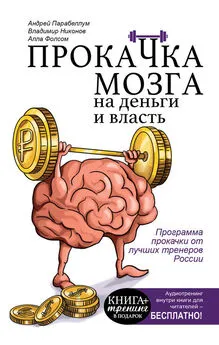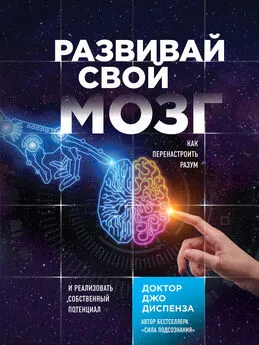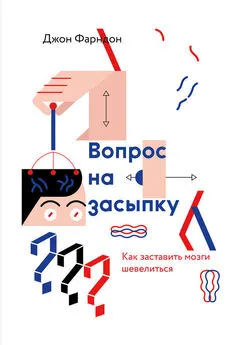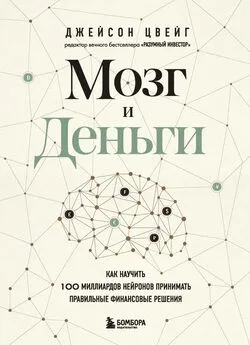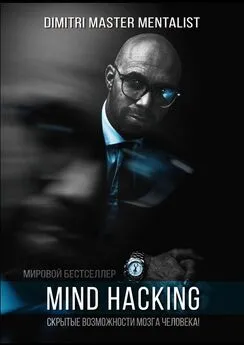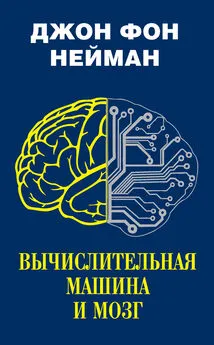Джон Харгрейв - Mind hacking. Как перенастроить мозг за 21 день
- Название:Mind hacking. Как перенастроить мозг за 21 день
- Автор:
- Жанр:
- Издательство:Литагент 5 редакция
- Год:2019
- Город:Москва
- ISBN:978-5-04-099967-5
- Рейтинг:
- Избранное:Добавить в избранное
-
Отзывы:
-
Ваша оценка:
Джон Харгрейв - Mind hacking. Как перенастроить мозг за 21 день краткое содержание
Mind hacking. Как перенастроить мозг за 21 день - читать онлайн бесплатно ознакомительный отрывок
Интервал:
Закладка:
Конец ознакомительного фрагмента.
Текст предоставлен ООО «ЛитРес».
Прочитайте эту книгу целиком, на ЛитРес.
Безопасно оплатить книгу можно банковской картой Visa, MasterCard, Maestro, со счета мобильного телефона, с платежного терминала, в салоне МТС или Связной, через PayPal, WebMoney, Яндекс.Деньги, QIWI Кошелек, бонусными картами или другим удобным Вам способом.
Примечания
1
“The Hacker’s Dictionary, Version 4.3.0,” Dourish.com, April 30, 2001, http://www.dourish.com/goodies/jargon.html.
2
Walter Isaacson, Steve Jobs (New York: Simon & Schuster, 2011), 61.
3
Ibid., 59.
4
Sam Williams, Free as in Freedom: Richard Stallman’s Crusade for Free Software (Sebastopol, CA: O’Reilly Media, 2002), http://oreilly.com/openbook/freedom/ch01.html.
5
Ibid.
6
Richard Stallman, “Free Software Is Even More Important Now,” GNU.org, http://gnu.org/philosophy/free-software-even-more-important.html.
7
“Usage statistics and market share of Unix for websites,” W3Techs , http://w3techs.com/technologies/details/os-unix/all/all.
8
“September 2012 Web Server Survey,” Netcraft , http://news.netcraft.com/archives/2012/09/10/september-2012-web-server-survey.html
9
“Browser Statistics,” W3Schools , http://www.w3schools.com/browsers/browsers_stats.asp.
10
Онлайн-версия этой книги распространяется по лицензии Creative Commons Attribution-NonCommercial-ShareAlike 4.0 International License. Дополнительную информацию можно найти на сайте http://creativecommons.org/licenses/by-nc-sa/4.0.
11
Tim Ferriss, The 4-Hour Body: An Uncommon Guide to Rapid Fat-Loss, Incredible Sex, and Becoming Superhuman (New York: Crown Publishing Group, 2010), 484–489.
12
Daniel Pink, Drive: The Surprising Truth About What Motivates Us (New York: Riverhead Hardcover, 2009).
13
Chris Hardwick, The Nerdist Way: How to Reach the Next Level (in Real Life) (New York: Penguin, 2011).
14
Steven Leckart, “The Hackathon Is On: Pitching and Programming the Next Killer App,” Wired , March 2012.
15
Stephen Lepore and Joshua Smyth, “The Writing Cure: How Expressive Writing Promotes Health and Emotional Well-Being” (Washington, DC: American Psychological Association, 2002).
16
S. Spera, E. Buhrfeind, and J. W. Pennebaker, “Expressive Writing and Coping with Job Loss,” Academy of Management Journal 37, No. 3 (1994): 722–733. Эту информацию я нашел благодаря книге Richard Wiseman 59 Seconds: Change Your Life in Under a Minute (New York: Anchor, 2010).
17
Amy Shira Teitel, “The Cost of Curiosity,” AmyShiraTeitel.com, Sept. 28, 2012, http://amyshirateitel.com/2012/09/28/the-cost-of-curiosity.
18
Joe Palca, “Crazy Smart: When a Rocker Designs a Mars Lander,” NPR, Aug. 3, 2012, http://www.npr.org/2012/08/03/157597270/crazy-smart-when-a-rocker-designs-a-mars-lander.
19
“Curiosity’s Seven Minutes of Terror,” jpl.NASA.gov, June 22, 2012, http://www.jpl.nasa.gov/video/details.php?id=1090.
20
Guy Webster and Dwayne Browne, “NASA’s Mars Curiosity Rover Marks First Martian Year,” NASA.gov, June 23, 2014, http://www.nasa.gov/press/2014/june/nasa-s-mars-curiosity-rover-marks-first-martian-year-with-mission-successes.
21
“Mars Science Laboratory: Mission Science Goals,” NASA.gov, Aug. 21, 2012, http://mars.nasa.gov/msl/mission/science/goals.
22
Susan Blackmore, Consciousness: An Introduction (London: Routledge, 2010). Блэкмор написала книгу о сознании, и ее упражнения вдохновили меня на создание игр разума в этой книге. Цель упражнений Блэкмор – показать человеку иллюзорную природу разума. Я настоятельно рекомендую ее книгу продвинутым хакерам разума.
23
Sylvia Nasar, “The sum of a man,” Guardian , March 25, 2002, http:// www.theguardian.com/books/2002/mar/26/biography.highereducation.
24
Tore Frangsmyr (ed.), Les Prix Nobel: The Nobel Prizes 1994 (Stockholm: Nobel Foundation, 1994), http://www.nobelprize.org/nobel_prizes/economic-sciences/laureates/1994/nash-bio.html.
25
“Glimpsing Inside a Beautiful Mind,” Schizophrenia.com, April 10, 2005, http://www.schizophrenia.com/sznews/archives/001617.html.
26
Sylvia Nasar, A Beautiful Mind: A Biography of John Forbes Nash, Jr., Winner of the Nobel Prize in Economics, 1994 (New York: Simon & Schuster, 1998).
27
John Milnor, “John Nash and the Beautiful Mind,” Notices of the American Mathematical Society 45, No. 10 (1998): 1329.
28
Wendy Hasenkamp and Lawrence W. Barsalou, “Effects of Meditation Experience on Functional Connectivity of Distributed Brain Networks,” Frontiers in Human Neuroscience , March 1, 2012.
29
Daniel Goleman, “Exercising the Mind to Treat Attention Deficits,” New York Times , May 12, 2014, http://well.blogs.nytimes.com/2014/05/12/exercising-the-mind-to-treat-attention-deficits.
30
Информацию о работах математика Курта Годеля вы найдете в превосходной книге Douglas Hofstadter, I Am a Strange Loop (New York: Basic Books, 2007).
31
Thomas H. Davenport and John C. Beck, The Attention Economy: Understanding the New Currency of Business (Boston: Harvard Business School Press, 2002).
32
Robert Rogers and Stephen Monsell, “The Costs of a Predictable Switch Between Simple Cognitive Tasks,” Journal of Experimental Psychology: General 124, No. 2 (1995): 207—31.
33
Joshua S. Rubinstein, David E. Meyer, and Jeffrey E. Evans, “Executive Control of Cognitive Processes in Task Switching,” Journal of Experimental Psychology: Human Perception and Performance 27, No. 4 (2001): 763–797.
34
Edward M. Hallowell, Crazy Busy: Overstretched, Overbooked, and About to Snap! Strategies for Handling Your Fast-Paced Life (New York: Ballantine Books, 2007).
35
Bill Chappell, “Stanford Professor Who Sounded Alert on Multitasking Has Died,” NPR , Nov. 7, 2013, http://www.npr.org/blogs/thetwo-way/2013/11/07/243762058/stanford-professor-who-sounded-alert-on-multitasking-has-died (получено 1 декабря 2013 года). Выделение мое.
36
Soren Gordhamer, Wisdom 2.0: Ancient Secrets for the Creative and Constantly Connected (New York: HarperOne, 2009).
37
“ADHD Data and Statistics,” Centers for Disease Control and Prevention , Nov. 13, 2013, http://www.cdc.gov/ncbddd/adhd/data.html.
38
“Frequent Cell Phone Use Linked to Anxiety, Lower Grades and Reduced Happiness in Students, Kent State Research Shows,” Kent State University, Dec. 6, 2013, http://www2.kent.edu/news/news-detail.cfm?newsitem= C87DA8EB-0E77-DCF2-AAD1C317FB742933.
39
“Turn Off Your Smart Phone to Beat Stress,” British Psychological Society , Dec. 1, 2012, http://www.bps.org.uk/news/turn-your-smart-phone-beat-stress.
40
William James, The Principles of Psychology (New York: H. Holt and Company, 1890), chapter 11.
41
H. Pashler, J. Johnston, and E. Ruthruff, “Attention and Performance,” Annual Review of Psychology 52, No. 1 (2001): 629–651.
42
Benedict Carey, “Remembering, as an Extreme Sport,” New York Times , May 19, 2014, http://well.blogs.nytimes.com/2014/05/19/remembering-as-an-extreme-sport.
43
Tim Wu, “How Today’s Computers Weaken Our Brain,” New Yorker , Sept. 9, 2013, http://www.newyorker.com/tech/elements/how-todays-computers-weaken-our-brain.
44
B. V. Zeigarnik, “Uber das Behalten von erledigten und unerledigten Handlungen” (“The retention of completed and uncompleted activities”), Psychologische Forschung , No. 9 (1927): 1—85.
Интервал:
Закладка:
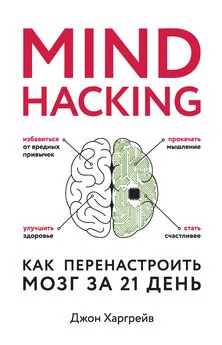
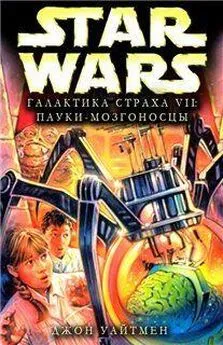
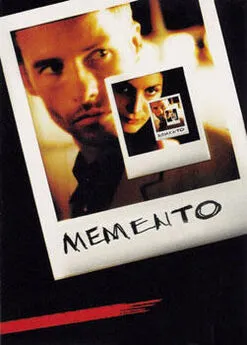
![Джон Уиндэм - День триффидов [День триффидов. Куколки. кукушки Мидвича. Кракен пробуждается]](/books/584407/dzhon-uindem-den-triffidov-den-triffidov-kukolk.webp)
